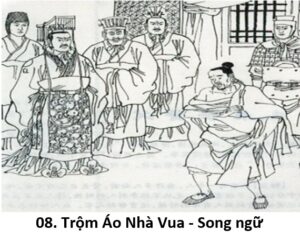Trộm Áo Nhà Vua – A Rustic Steals Clothes From The Palace Treasury – Song ngữ
English: Tetcheng Liao.
Việt ngữ: Hòa Thượng Thích Tâm Châu.
Compile: Middle Way Group.

A Rustic Steals Clothes From The Palace Treasury – Trộm Áo Nhà Vua
Once upon a time there was a rustic who stole garments from the palace and then escaped to a remote place. The king sent men to search for him in all directions. Finally, he was arrested and taken to the king who accused him of theft and asked him where he had got the clothes. The rustic answered that they belonged to his grandfather. The king then ordered him to put them on. He did not know how to wear them. He put on his arms what should be worn on his legs. What he ought to have on his waist, he put on his head. Seeing this, the king summoned his ministers for consultation on the matter. “If the clothes belonged to your grandfather, you should know how to wear them. How can you wear them in all wrong ways? It’s certain that they are not your old clothes. You have stolen them,” said the king.
Xưa có người mọi lấy trộm các đồ-vật trong kho nhà vua rồi chạy trốn. Nhà vua sai người đi khắp nơi tìm, bắt đem về. Vua hỏi: “Áo kia của ngươi do đâu có?” – Người mọi đáp: “Áo này là bảo-vật của ông cha tôi để lại!” – Vậy ngươi mặc xem? – nhà vua bảo. Người mọi mặc: Tay áo mặc vào đầu gối, lưng áo trùm lên đầu. Nhà vua thấy đúng là áo ăn trộm mới họp quần-thần lại, nói rõ đầu-đuôi rồi quay sang bảo người mọi: “Áo này nếu là của ông cha ngươi để lại, thời ngươi phải biết mặc, sao ngươi mặc lộn-bậy như vậy? Vì ngươi không biết mặc nên biết hẳn áo này là áo ngươi ăn trộm, chứ không phải là vật cũ của nhà ngươi!”
Figuratively speaking, here the king is like Buddha; the valuable clothes, the Buddhist teachings; the stupid rustic, the heretic. A heretic, who has eavesdropped on Buddhism, makes it for his own. He then misinterprets it, because he does not know the real meaning of its teachings. This heretic is like the rustic who stole the king’s valuable clothes without knowing how to wear them properly and put them on in all the wrong ways.
Mượn làm ví-dụ: “Vua” ví như “bảo-tạng như-pháp” (chân-lý) của Phật; “người mọi ngu-si” ví như ngoại-đạo nghe trộm chính-pháp của Phật lồng vào trong pháp của mình, cho là mình có. Song, vì không hiểu-biết, xếp-đặt Phật-pháp lộn-lạo trên, dưới, không biết pháp-tướng (sự-tướng trong Phật-pháp, tướng-trạng của sự-vật) ra sao. Như người mọi được áo quý của nhà vua, không biết lần-lượt, mặc lộn-bậy đầu-đuôi cũng thế!
Sources:
Tài liệu tham khảo:
- http://www.buddhism.org/Sutras/2/FablesSutra.htm
- https://tienvnguyen.net/a615/kinh-bach-du-sakyamuni-s-one-hundred-fables
- https://daitangkinh.net/?f=Kinh-Bach-Du/1#c2
- https://dspace2.creighton.edu/xmlui/handle/10504/82822
- https://quangduc.com/a32166/kinh-bach-du
- https://phatphapungdung.com/phap-bao/kinh-bach-du-thich-tam-chau-dich-113682.html
